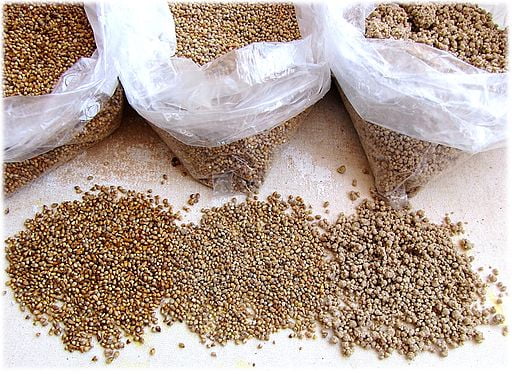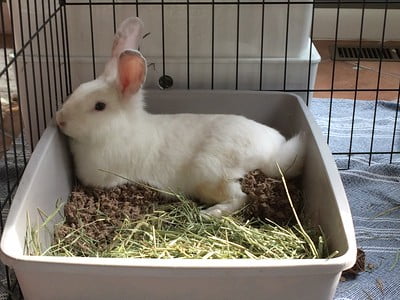Last Updated on March 4, 2023 by Marjon Ramos
Quick Facts About Raspberry:
- Scientific name – Rubus idaeus
- Also known as – Wild Red, Brambles, and Brambleberry.
- Origin – Europe
- Most commonly found in – Serbia and Chile.
- Average weight – 5 grams
Raspberries are safe to be given to rabbits as long as your rabbit is at least 7 months old and you only give it 1-2 times per week.
Sticking to these rules would prevent any possibility of triggering digestive problems.
Also, talk to your veterinarian if your rabbit is old (6 years old).
Older rabbits have a slower metabolism.
This in turn could lead to obesity when a rabbit is fed sugary treats like raspberries.
Now that I’ve given you the gist of the article, read on as I explain in more detail why rabbits can eat raspberries:
Table of Contents
Do rabbits like eating raspberries?
In my case, both of my rabbits (Tyr and Freya) loved raspberries.
I’m pretty sure both of my rabbits would eat the whole pack of raspberries if I allowed them to (not that I would) — that’s how much they love raspberries!
I’ve also asked several of my friends who have rabbits if they ever fed raspberries to their babies and their reaction to it.
All of them reported giving raspberries to their rabbits.
Are raspberries safe to be eaten by rabbits?
Raspberries are completely safe to be eaten by rabbits as long as your rabbit is old enough (7 months or older) to eat them and you’re only giving them in moderation, or 1-2 times per week.
Most of the danger happens because rabbit owners overfeed their rabbits sugary treats like raspberries in lieu of hay.
The lack of fiber in their rabbit’s diet is what leads to digestive problems, not the sugary treats themselves.
Finally, raspberries or other sugary treats should not be fed to rabbits that are suspected of having digestive problems.
Feeding sugary treats to sick rabbits could exacerbate the problem.
What are the benefits of feeding raspberries to rabbits?
To properly understand the benefits of raspberries, you can use the nutrient constrain calculator to determine the amount of nutrients your rabbit is getting based on the amount you give.
You can also click on the blue icon beside the nutrient to show the different benefits and deficiencies of each nutrient:
Nutrient Constrain Calculator For Rabbits
Warning:
Although raspberry has these benefits, overfeeding your rabbit is not recommended. This is only to inform you of the different vitamins and minerals your rabbit can get when you give them raspberries.
As you can see from the nutrient constrain calculator above, raspberries contain small amounts of nutrients per 100 grams.
But, as an occasional treat, it’s perfectly fine to have low nutritional value.
You should never rely on treats to meet any of your rabbit’s nutritional needs anyway.
Are raspberries good for rabbits?
Raspberries contain small amounts of vitamin A, E, B6, copper, pantothenic acid, niacin, choline, protein, fiber, calcium, phosphorus, and magnesium.
All of which is great for rabbits as long as you only give raspberries in moderation.
How much raspberries can a rabbit eat?
The amount of raspberries you should give your rabbit would depend on their current weight and age.
You can use the diet portion calculator to determine the proper amount of raspberries (treats) to give to your rabbits:
Diet Portion Calculator For Rabbits
If you don’t know your rabbit’s weight, here’s a table that shows the estimated weight of rabbit breeds and the allowed raspberries 1-2 times per week:
| Rabbit’s weight based on breed | Allowed raspberry |
|---|---|
| Small breed (1.1–3.5 pounds) | 1 teaspoon |
| Medium breed (6 to 10 pounds) | 1-2 tablespoon |
| Large breed ( 9 and 12 pounds) | 2-3 tablespoon |
At what age can rabbits eat raspberries?
The table above on how much raspberries to give your rabbits assumes that your rabbit is at least 7 months old.
Another important factor when deciding how many raspberries to give your rabbit is their age.
Here’s a table that shows how much raspberry to give based on your rabbit’s age:
| Age | Fruits |
|---|---|
| 7 weeks to 7 months | — |
| 7 months to 1 year | No more than 1-2 oz (30-60g) per 6 lbs (2.7 kg) BW |
| Adult (1-5 y) | No more than 2 tbsp per 6 lbs (2.7 kg) BW |
| Seniors (>6 y) | Talk to your veterinarian for a more specialized diet. |
When should you not feed raspberries to rabbits?

Gist:
Stop giving raspberries to rabbits who are having digestive problems.
The proper protocol whenever you suspect or know that your rabbit is having digestive problems is to remove any other food from their diet except hay.
This would ensure that your rabbit is getting their required fiber for the day, which is the most important part of their diet.
Then, bring your rabbit to a veterinarian as soon as possible.
Digestive problems are dangerous to rabbits, especially when young.
Risk of overfeeding raspberries to rabbits.
While raspberry is safe and nutritious for rabbits, there are still risks associated when a rabbit owner overfeeds their rabbits:
- Gastrointestinal Stasis: Overfeeding raspberries in lieu of hay to your rabbits could lead to GI stasis, which is caused by a lack of fiber in your rabbit’s diet.
- Diarrhea: Diarrhea is also possible when rabbit owners overfeed large amounts of raspberries to their rabbits too fast. Always introduce any new diet to your rabbits slowly.
- Uneaten cecotropes: Soft uneaten cecotropes are also possible when rabbits are eating large amounts of raspberries instead of hay. This could lead to softer cecotropes due to the lack of fiber.
- Dental problems: Due to the sugar content of raspberries, feeding your rabbits large amounts of them could lead to dental problems.
- Obesity: Overfeeding raspberries to older rabbits, whose metabolism is slower, could lead to obesity due to the high sugar content of raspberries. Obesity could also lead to uneaten cecotropes, or “poopy bottoms,” because obese rabbits wouldn’t be able to reach their cecotropes to eat them.
Healthy alternatives to raspberry.
While raspberries are a great treat to feed your rabbits, experts in the field recommend that we, as rabbit owners, mimic the diet of wild rabbits.
Wild rabbits have an abundance of choices when it comes to their diet.
Here are some alternatives to raspberries that you can give to your rabbits one to two times per week as a treat:
FAQ (Frequently Asked Questions)
Can rabbits eat raspberry leaves?
Yes, raspberry leaves and plants are safe to be given to rabbits.
Just don’t go overboard with it and only feed moderate amounts, and make sure that your rabbit is old enough to eat greens.
Can rabbits eat raspberries daily?
No, raspberries and other sugary treats should only be given 1-2 times per week to a 7-month-old rabbit.
Feeding it daily could lead to digestive problems like diarrhea and GI stasis, as well as dental problems.
Conclusion
Raspberries should only be given to 1-2 times per week for a 7-month-old rabbit.
Feeding raspberries to younger rabbits could lead to digestive problems.
While feeding it in excessive amounts, even on older rabbits, would eventually lead to digestive and dental problems as well as obesity.
Make sure your rabbit is not eating raspberries in lieu of hay to avoid the problems I stated above.
Cite this article:
Related Articles
- Can Rabbits Eat Asparagus? 9 things you need to know.
- Can Rabbits Eat Tomatoes? What You Need To Know.
- Can Rabbits Eat Watermelon? What You Need To Know.
- Can Rabbits Eat Grapes? What You Need To Know.
- Can Rabbits Eat Broccoli? What You Need To Know.
- Can Rabbits Eat Apples? What You Need To Know.
- Can Rabbits Eat Cabbages? What You Need To Know.
- Can Rabbits Eat Strawberries? What You Need To Know.
- Can Rabbits Eat Bananas? What You Need To Know.
- Can Rabbits Eat Oranges? 9 things you need to know.
- Can Rabbits Eat Blueberries? Here’s Why.
- Can Rabbits Eat Spinach? Your Questions Answered.
- Can Rabbits Eat Cucumbers? Here’s Why.
- Can Rabbits Eat Celery? What you need to know.
- Can Rabbits Eat Radishes: Everything You Need To Know
Sources
- Raspberries, raw
- Patry, Karen, et al. The Rabbit-Raising Problem Solver: Your Questions Answered about Housing, Feeding, Behavior, Health Care, Breeding, and Kindling. Storey Publishing, 2014.
- Digestive disorders
- Health Problems in Rabbits
- Obesity in Rabbits
- BSAVA Manual of Rabbit Medicine




